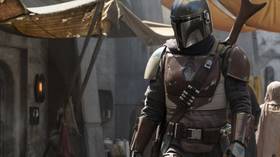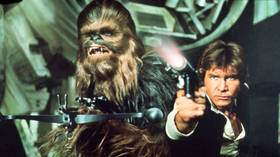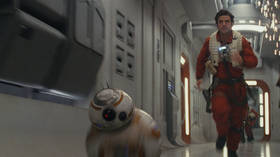'The Mandalorian' marks the official death of Star Wars

"Star Wars" used to be religion to past generations, but Disney's oversaturation of the franchise has gone too far with "The Mandalorian." The fever-pitch enthusiasm that surrounded the franchise is now a thing of the past.
A long time ago in a galaxy far, far away there was a young artist named George Lucas who created a world that became a cultural phenomenon.
1977's "Star Wars: A New Hope" took the world by storm, and the sequels were the sort of movie events that had never been seen before. Kids and adults alike counted the days until 1980's "The Empire Strikes Back" and 1983's "The Return of the Jedi." The story of a young farm boy who zips across space with a princess, an outlaw and a Wookie to defeat an evil empire became gospel to many.

Listening to my father and others who came of age when these movies first premiered talk about "Star Wars" was like listening to them tell of a different, better world. Eyes would gloss over and nostalgia would take hold, as the memories of playing with figures and creating their own stories and being transported to other worlds in the darkness of a theater came back.
Then came the prequels. For as much pushback as Lucas' second trilogy got, those movies held the same glorified place in my heart as the original trilogy did for my father's generation. They were the great connector. Any two teenagers, no matter how different, could find something to connect over if "Star Wars" was brought up. If you failed to catch these movies on the big screen, then you were missing out. They were events as much as the original trilogy was.
This was also long before the internet became a daily part of our lives, so you would go see some lesser movie (here's looking at you, "Meet Joe Black") just to get a taste of what Lucas had in store for you. These were the movies you could openly applaud and cheer in a theater, without feeling uncomfortable because everyone around you was doing the same thing.
What the new "Star Wars" projects from Disney have done is make it obvious that one of the special things about those original "Star Wars" pictures is that each one was treated as an event. Just like kids would once gather around a radio every week to get a new chapter of "The Green Hornet," each chapter in the "Star Wars" saga was greeted with a fever pitch enthusiasm very few movies can reach today.
When Disney bought LucasFilm in 2012, it sounded like a logical move. Lucas seemed to have outgrown the franchise and fans were rebelling — there was even a 2010 documentary, titled "The People vs. George Lucas," that examined the disdain many fans had for Lucas and his endless marketing and merchandising of the sacred franchise.
Disney's "Star Wars" projects thus far have capitalized on nostalgia and novelty, and the original ideas introduced into the franchise have been half-baked at best — can anyone explain what happened in "The Last Jedi" at this point?
The last nail in the coffin, though, is "The Mandalorian," the new Jon Favreau-created show that is helping to launch Disney's new streaming service, Disney Plus.
The show itself is … fine. It's got Werner Herzog, so that's something. The real problem is "Star Wars" is no longer the special cultural phenomenon it used to be. It's just yet another glossy, fast food franchise out of Hollywood with content just expensive enough to look good and just unsatisfying enough to make you feel the need to spend money on more.
Also on rt.com Disney+ recuts own classics: Why do corporate gatekeepers think we will turn racist if they don't censor content?Disney's yearly movies had already sucked the air out of the franchise a bit and now "The Mandalorian" — plus the countless other "Star Wars" shows in the pipeline — promises this franchise will be stretched thinner and thinner until it finally snaps. And then Disney will do what it always does: tuck it away for a few years, let the bad memories subside and then hit us with a reboot.
"The Mandalorian" is dropping episodes weekly on Disney Plus (a new episode premieres this Friday) in an attempt to recapture that event feel the franchise used to have, but it's just not the same. A weekly series made by committee doesn't have the same impact as those films we were given every three or four years, each one a solid push forward, a new chapter in a story that always had an end in sight. "Star Wars" now is just an endless wheel Disney will spin until it stops spitting out cash, and the end is already nigh in that regard.

"The Last Jedi" and "Solo" got major backlash from fans for their blatant attempts to appeal to woke crowds, their muddled stories and for the sheer fact that they felt like films made by a group of men in business suits rather than an inspired artist — which could explain the abrupt change in directors on "Solo" mid-production.
What used to be "Star Wars" is long gone. Content like "The Mandalorian" wants to be an event, but doesn't want to put in the actual work needed to be one. There are fans of the new Disney "Star Wars" material, but the excitement that once swirled around every chapter of the franchise is dead and buried. Now what used to be distracting sidebars by Lucas — the "Holiday Special," those terrible animated shows about Ewoks and droids — has become the main focus of the project, only they're now pumped with hundreds of millions of dollars, courtesy of the House of Mouse.
Change is inevitable, but what's sad is that the "Star Wars" gospel is gone. No longer will a father sit his son down and be able to explain the specialness of "Star Wars," the patience, the excitement, the imagination that comes with the wait for every new, exciting chapter, each one building to an actual conclusion. That common bond has been severed and "Star Wars" is now just like every other franchise pumping material out today. So long, old friend. It was good while it lasted.
By Zachary Leeman, an author and journalist who covers art and culture
The statements, views and opinions expressed in this column are solely those of the author and do not necessarily represent those of RT.














